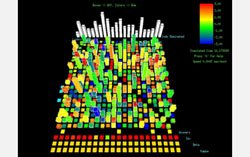- About MAA
- Membership
- MAA Publications
- Periodicals
- Blogs
- MAA Book Series
- MAA Press (an imprint of the AMS)
- MAA Notes
- MAA Reviews
- Mathematical Communication
- Information for Libraries
- Author Resources
- Advertise with MAA
- Meetings
- Competitions
- Programs
- Communities
- MAA Sections
- SIGMAA
- MAA Connect
- Students
- MAA Awards
- Awards Booklets
- Writing Awards
- Teaching Awards
- Service Awards
- Research Awards
- Lecture Awards
- Putnam Competition Individual and Team Winners
- D. E. Shaw Group AMC 8 Awards & Certificates
- Maryam Mirzakhani AMC 10 A Awards & Certificates
- Two Sigma AMC 10 B Awards & Certificates
- Jane Street AMC 12 A Awards & Certificates
- Akamai AMC 12 B Awards & Certificates
- High School Teachers
- News
You are here
University of Tennessee to House New Mathematical Biology Center
September 10, 2008
The University of Tennessee, in Knoxville, has beaten 18 rivals in a bid to host a national mathematical center that will focus on biological issues, such as the dynamics of animal diseases.
The new National Institute for Mathematical and Biological Synthesis (NIMBioS) is funded to the tune of $16 million by the National Science Foundation. It could "become the place people think of first in linking mathematics and biology," said Louis Gross, who is its director and a mathematical ecologist at the University of Tennessee. "Mathematical biology has traditionally been one little corner of biology. We want to move it to a central role," Gross told Nature.

Emergence of within-group coalitions and alliances is shown in this graphical output of a simulation model.
The institute's creation highlights the growing importance of mathematical biology—and a particular concern about the spread of animal diseases to people. Four-fifths of emerging human diseases cross over from animals, said Tam Garland, branch chief for agricultural security at the U.S. Department of Homeland Security, which is a partner in the venture and will provide some of the funding.
Mathematical modeling, which has been used to predict and help control disease outbreaks, "is a decision tool," Garland said. "What we're supporting with this center is fundamental research and growing the next generation of researchers."
"At the start of the 21st century, biologists will become increasingly quantitative and interdisciplinary," said NSF's James Collins. "The new institute has a broad mandate to pursue excellence at the interface of the life sciences and mathematics."
NIMBioS will bring together small groups of researchers from mathematics, biology, and other fields to approach very specific issues that face the country. Plans for the first year include investigating links between the mathematics of invasive species and cancer; the dynamics of social networks in animals; and modeling the spread of pseudorabies in feral pigs in the southern U.S.
About a dozen postdoctoral positions will be funded, along with working groups of 8 to 15 researchers who will concentrate on specific issues.
The grant follows on the heels of the NSF creation of the National Institute for Computational Sciences at UT Knoxville, a $65 million award to build and operate a supercomputer to assist scientists worldwide.
Source: National Science Foundation, Sept. 3, 2008; Nature, Sept. 1, 2008.
Id:
414
Start Date:
Wednesday, September 10, 2008




